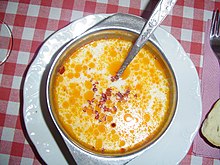Bulgarian cuisine

The Bulgarian cuisine belonging to the Balkan cuisine is the national cuisine of Bulgaria . Like the kitchens of other countries on the Balkan Peninsula , Bulgarian cuisine has been exposed to oriental and Mediterranean influences for centuries .
Agriculture
Bulgarian cuisine is based on the grains grown in the Danube Plain , especially wheat and maize , and in the south of the country also on rice . In animal husbandry , cattle and pigs play the most important role, there are also water buffalo and game. The most important type of fruit is the apricot . Almond trees , walnuts , chestnuts , peanuts and figs also grow here .
Local dishes
breakfast
A typical Bulgarian breakfast is baniza with boza .
Starters, soups and salads
Tarator is a cold soup made from cucumber and yogurt. Other starters, soups and salads are meze , Schopska salad , Thrakija salad , Schkembe chorba and Supa toptscheta .
Snacks
Pitka , a well-known type of bread, is often eaten together with “colored salt”, a spice mixture made from chubritsa, cumin , fenugreek, salt, pepper and sometimes chili powder , whereby the piece of bread is dipped in a bowl with spices. Schopska salad is often served with it. Other snacks are Mekiza and Baniza . Ljuteniza is a paste made from peppers, eggplant and tomatoes, or just peppers and tomatoes. In contrast to Ajvar , Ljuteniza is made from grilled and peeled paprika and peeled tomatoes, which gives it a very fine and smoky taste.
Main courses
One- pot dishes with or without meat are very common . In winter, cabbage , sauerkraut , potatoes , legumes , but also plums , dried apricots and chestnuts are used as ingredients. In spring, onions, garlic, spinach , peas and other seasonal vegetables are more likely to be used . While the meat of older animals such as mutton is on the menu in winter , young animals such as lamb are traditionally eaten in spring . In contrast to neighboring countries, however, this is increasingly limited to private dining at home. A combination of lamb with winter vegetables is considered inappropriate. The traditional season for lamb dishes begins in April on St. George's Day . Fish and seafood specialties include sprat , mussels , stuffed carp with walnuts (which is consumed on St. Nicholas' Day on December 6th), squid , squid and octopus salad . Gjuveche is a traditional Bulgarian dish that is prepared in special clay pots. The possibility of using leftovers from other dishes in this dish ensures that this dish is still popular today and is on the menu in most Bulgarian restaurants - however, the Gjuwetsche is freshly prepared in the restaurants, the leftovers are only used Home. Other main dishes include stuffed peppers , sarma (sauerkraut or vine leaf roulade) and pasulj , a pea or bean stew with meat.
Desserts
A Bulgarian dessert is pogača .
ingredients
Sunflower oil dominates as an edible fat today , while walnut oil and sesame oil were also used in the past . Lard or butter is used for some dishes, animal fats are generally avoided and, in most households, the meat is thoroughly removed from fat before preparation. Since the 16th century, chili has been added to many dishes to give them a red color.
Food culture
In the bigger cities of Bulgaria there are also Bulgarian fast food chains that offer traditional dishes.
Others
- The Bulgarian yogurt. One of the preferred foods is yogurt . Bulgarian yogurt is world-famous for its unique bacterial culture, Lactobacillus bulgaricus . Around two thirds of the milk produced is processed into this dairy product. Yoghurt made from sheep's milk or buffalo milk are special specialties . Already around the year 700 milk was fermented in the area of what is now Bulgaria to produce katuk , an acidified milk product with a long shelf life .
- Buffalo yogurt, especially for dessert with honey, or blueberry jam
cheese
- Sirene , the ever-popular white cheese, is a part of almost every Bulgarian dish.
- Kashkawal
- Water buffalo cheese
beverages
Wines
Types of beer
In addition to a large number of imported international brands, Bulgaria also has a number of domestic beers. In addition, many branded beers are produced under license in Bulgaria (e.g. Becks, Heineken)
- Sagorka , brewed in Stara Sagora
- Burgasko piwo , brewed in Burgas
- Schumensko piwo , brewed in Schumen
- Ariana , brewed in Sofia
- Stolichno piwo , brewed in Sofia
- Kamenitza, brewed in Plovdiv
- Pirinsko, brewed in Blagoevgrad
Liqueurs and schnapps
Rakija
Rakija is the national drink in Bulgaria:
Further
- Slanchev brjag
- Pliska
- Karnobatska Menta , a mint liqueur made from Karnobat
- Karnobatska Mastika , a mastika made from Karnobat
swell
- Alan Davidson: The Oxford Companion to Food , 2nd ed. Oxford 2006, article Bulgaria , p. 112 f.
